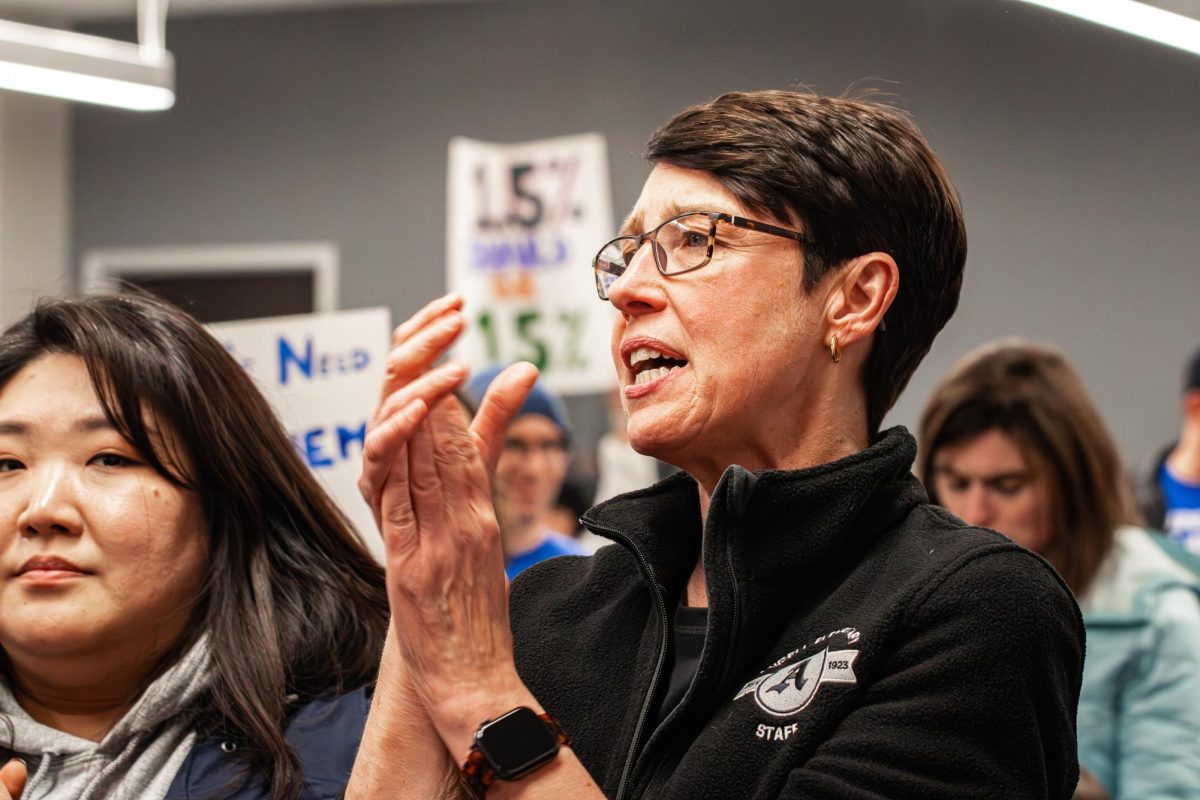Toby Mayo knew from a young age that he was male, even if society said otherwise. By 14, the Washtenaw Community College freshman and Huron alumnus was already eagerly planning the beginning of his transition. But it would only be at 18 years old that he started testosterone.
This is the long and lengthy journey for many transgender youth towards gender affirming care in Michigan today, and it is only getting longer from here with the University of Michigan Health’s recent decision to ban gender affirming care for youth under the age of 19.
“My main struggle with gender affirming care was how long it took,” Mayo said. “It took a little over a year to get all of the processes done to just start.”
Gender affirming care has long been an extensive process mainly because of lack of specialists. It doesn’t just take one doctor, but multiple, from psychiatrists to surgeons. Outside of this, many of the hormones prescribed could create irreversible effects that must be carefully considered. This process’ timeline is only continuing to grow today with UM’s recent changes to care.
“I’m currently about to turn 19, so I’m blessed to not have to worry about those things,” Mayo said. “But I’m mostly concerned about how far they will go.”
The UM Health’s decision from a national lens
The UM Health’s decision was released on Aug. 25 and has hit the surrounding Ann Arbor and Michigan community. The decision outlines that any puberty blockers or gender affirming hormones may no longer be prescribed to patients under 19 years old.

“In response to unprecedented legal and regulatory threats to our clinicians and our institution, we have made the difficult decision to stop prescribing puberty blockers and gender affirming hormones for patients under age 19,” UM’s Health website said.
In the past year, gender affirming care has not only been a controversial topic for the city of Ann Arbor, but all of America. This past June, the Supreme Court of the United States of America ruled on the groundbreaking United States v. Skrmetti case in favor of Tennessee with a vote of 6-3. The controversy of the case began with Tennessee’s statewide implementation of the Prohibition on Medical Procedures Performed on Minors Related to Sexual Identity, which restricts sex-transition treatment for minors.
“The current standards recognize known risks associated with the provision of sex transition treatments to adolescents, including potential adverse effects on fertility and the possibility that an adolescent will later wish to detransition,” the Supreme Court website said. “They further state that there is “limited data on the optimal timing” of sex transition treatments or “the long-term physical, psychological, and neurodevelopment outcomes in youth.”
By ruling in favor of Tennessee, the Supreme Court set up precedent for other states to follow suit with their own policies towards gender-affirming care; policies that have now reached Michigan.
“I have a friend who has been on testosterone since he was 14, and they’re now taking it away,” Mayo said. “Even worse, they’re cutting him off cold turkey, which is not good in any sense since testosterone is a steroid which could cause withdrawal symptoms.”
Other clinics in Washtenaw county continue to provide recourses
While UM Health has changed their policies on gender affirming care, many other clinics in the Washtenaw County Area have been continuing to work to provide resources for transgender minors.
“This is about ensuring that a young person has access to all of the care that they need which is inclusive of services that are firming their gender identity and expression,” said Alex Plum, executive director of the Corner Health Center in Ypsilanti.
The Corner Health Center is a local clinic that works to offer affordable and judgement-free health care to young teens and adults. Their numerous different treatments include gender affirming care, and continue to do so through UM Health’s recent ban towards minors. While their previous work had been in collaboration with Michigan medicine, according to Plum, they have providers in their clinic who can prescribe medication and also give therapeutic resources.
Outside of prescribing physical care of transgender patients, the Corner Health Center also offers multitudes of family support and mental health services.
“We do a lot of patient education,” Plum said. “It’s really important that young people and their families understand all the elements that go into making decisions around gender care, and of course, we integrate mental health and so we wanna ensure that young people have access to all of those needs.”
Gender affirming care is also applicable to cisgender people
Despite Corner Health’s efforts to continue helping youth, the effects of UM Health’s decision are undeniable, and it is not limited to only transgender youth.
“It feels as if the government isn’t prioritizing us and, honestly, just doesn’t see us as people, rather just assets or things to be discarded,” said junior Kayla Fu, founder of non-profit organization FloFund, which helps with menstrual care. “When the government doesn’t see its citizens as people in rather just numbers you put people’s health at risk. You put lives at risk.”
Flofund is an organization committed to bringing support and shelter to women for menstrual care. As founder, Fu began it in

Photo Courtesy of Fu
hopes of reaching groups of women who didn’t have ready access to period care, including hormonal therapy for cisgender women.
“I see women struggling,” Fu said. “I wonder if they’re not going to be able to receive the care that they need.”
While some may assume that gender affirming care only applies to transgender people, this isn’t true. Gender affirming care is a large umbrella that includes puberty blockers, cosmetic procedures, and much more. All of these services are ones many Americans seek out, trans or cis.
Besides the care that will no longer be accessible to youth, the UM Health’s decision has also sparked fear in the youth for what could possibly be the future of healthcare.
“Gender affirming care is health care,” Fu said. “It falls under that subject, and taking that away is a risk of health care in general.
With this first step towards limits on services and care towards youth, there are still uncertainties on what other services UM Health may consider taking away. For some students, this isn’t just an attack on transgender youth, but healthcare for youth in total.
“I’m just scared that this is going to trickle down into other healthcare services,” Fu said. “That it’s only going to hurt things like care for women, for cisgender people and for everyone in general.”
Through all of the fear and unknown, though, organizations and youth continue to work together to advocate for gender affirming care. From FloFund to the Corner Health Center, it’s clear there is push back, and it isn’t stopping soon.
“I hope that UM Health will be able to open their eyes,” Mayo said. “I hope they can take off those corrupt glasses, and see the harm they are doing to the world.”









